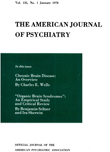INDIVIDUALIZING THE CARE OF THE AGING
Abstract
Fear of losing independence and individual identity precipitates emotional difficulties in aging people. These disturbances often occur long before actual incapacity. The time and degree of aging is individual. Our cultural attitude generally and artificially places it at retirement after the age of 65. Many problems of aging are now imposed rather than inevitable. Such problems require individual attention to prevent personality disorganization and to stimulate the best level of functioning in those with different degrees of organic physical or mental incapacity.
Social recognition of the value and usefulness of aging people with opportunities for employment and security consistent with their capacities and desires are necessary to solve the problems of a tremendously increasing aging population. Such advantages must be related to individual needs. Families need to understand their aging members. The physician, often a psychiatrist, must be completely familiar with the facilities of community services to meet individual needs for employment, financing, housing, religion, adult education, nursing homes, hospitals and medical attention.
Individualized care supports the morale and personality integration of those in their own homes, homes for the aging, or in hospitals including those for mental disorders. An environment without too much change or too many new people often enables confused patients to maintain a relatively clear sensorium. The aging should not be submerged in routine but should be encouraged, when capable, in hobbies or productive chores. They should be allowed some cherished possessions of their own for stability and reassurance offered by continuity with memories of the past. Personal relationships are a great support. Short walks, sitting outdoors, and recreation evoke interest. Maintenance of health habits and personal appearance are essential. The cases of 2 aged hospital patients are presented.
Access content
To read the fulltext, please use one of the options below to sign in or purchase access.- Personal login
- Institutional Login
- Sign in via OpenAthens
- Register for access
-
Please login/register if you wish to pair your device and check access availability.
Not a subscriber?
PsychiatryOnline subscription options offer access to the DSM-5 library, books, journals, CME, and patient resources. This all-in-one virtual library provides psychiatrists and mental health professionals with key resources for diagnosis, treatment, research, and professional development.
Need more help? PsychiatryOnline Customer Service may be reached by emailing [email protected] or by calling 800-368-5777 (in the U.S.) or 703-907-7322 (outside the U.S.).



